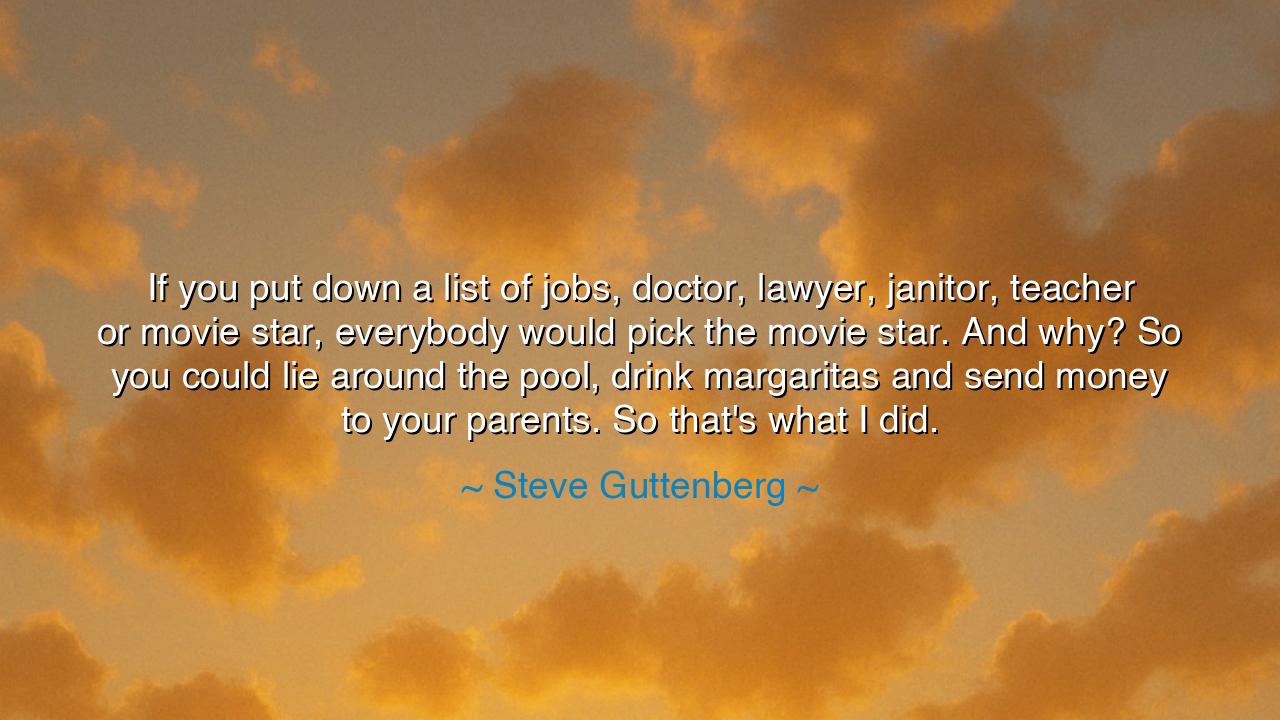
If you put down a list of jobs, doctor, lawyer, janitor, teacher
If you put down a list of jobs, doctor, lawyer, janitor, teacher or movie star, everybody would pick the movie star. And why? So you could lie around the pool, drink margaritas and send money to your parents. So that's what I did.






In the words of Steve Guttenberg, spoken with humor yet layered with truth, we hear the confession of a choice shaped by dreams of glamour: “If you put down a list of jobs, doctor, lawyer, janitor, teacher or movie star, everybody would pick the movie star. And why? So you could lie around the pool, drink margaritas and send money to your parents. So that’s what I did.” This saying, though playful, reveals the eternal human struggle between the noble callings of labor and the alluring vision of fame. It is a mirror held up to society, exposing what we often desire—not toil, not study, but the crown of visibility and luxury.
To place doctor, lawyer, janitor, teacher, and movie star side by side is to weigh different paths of life. The doctor heals, the lawyer defends, the janitor sustains, the teacher enlightens—all noble roles that uphold the world’s structure. Yet, Guttenberg reminds us, many are drawn instead to the star’s path, not for service but for the promise of ease. The image of “lying around the pool” with margaritas is less about the art of acting and more about the dream of reward without hardship. Herein lies a deep insight: what men envy is not always the craft, but the imagined pleasures that follow it.
Yet, history shows that the movie star’s path, like all paths, is not truly paved in ease. The bright light of fame blinds the eyes of the many, hiding the discipline beneath it. Consider Charlie Chaplin, who was seen by the masses as the carefree clown, yet behind every comic gesture lay hours of grueling practice, countless failures, and a relentless perfectionism. What the crowd imagined as leisure was in truth labor transformed. So too, Guttenberg’s jesting words remind us of how fantasy and reality diverge. The poolside vision may attract, but the art itself still demands sacrifice.
Still, there is nobility in his remark about sending money to parents. For in this small aside lies the timeless truth of filial duty. Though drawn by the lure of fame, Guttenberg speaks also of gratitude—that in his success he sought to honor those who raised him. This echoes the ancient commandment to honor one’s father and mother, a virtue praised in every culture. Thus, even within the playful choice of becoming a star, there is hidden a thread of respect and love that redeems the pursuit of personal glory.
We may recall the story of Alexander the Great, who, though driven by conquest, never forgot the lessons instilled by his mother Olympias and his teacher Aristotle. His ambition to claim the world was tied not only to personal hunger, but to fulfilling the destiny his family had impressed upon him. Like Guttenberg, Alexander’s outward triumphs were linked to an inward duty to those who shaped his life. Here we see again that even the pursuit of glory can be tempered by the bonds of gratitude.
The deeper lesson of this quote is not to condemn the desire for recognition, but to reflect on what we truly seek. Is it the craft itself, the joy of healing, teaching, creating—or merely the rewards we imagine those crafts bring? The danger lies in choosing paths only for the ease they promise, forgetting that all lasting greatness is born of discipline. Guttenberg’s words, delivered with humor, are in fact a gentle warning: do not be deceived by appearances, for even the poolside margarita is purchased with sweat unseen.
In practice, let us learn to honor all callings. The doctor, the teacher, the janitor, and even the movie star each carry burdens and sacrifices hidden from the public eye. If you choose a path, choose it not only for what it offers, but for what it requires of your soul. Ask not only, “What reward will I gain?” but, “What discipline will I embrace, and what service will I give?” And when fortune blesses you, remember—as Guttenberg did—to give back, especially to those who gave you life and nurtured your first steps.
Thus, the quote, though spoken lightly, stands as a parable of modern desire. “Everybody would pick the movie star.” But wisdom whispers: choose with eyes open, choose with gratitude, and choose not for imagined ease but for the true calling of your heart. Only then will your life, whether in starlight or in quiet labor, shine with meaning.






AAdministratorAdministrator
Welcome, honored guests. Please leave a comment, we will respond soon